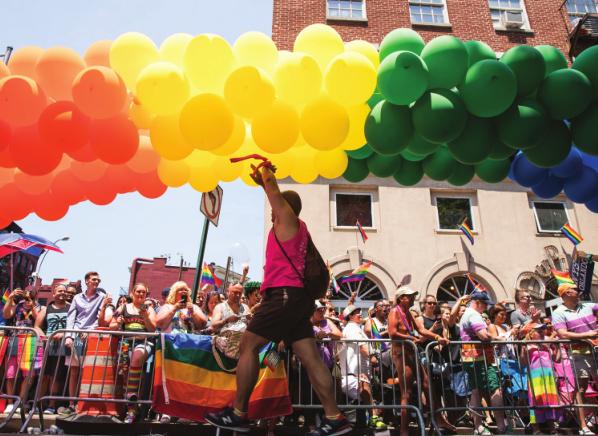 |
|
Participants march in the New York City Pride March on Sunday in New York. Millions of people draped in the rainbow hues of LGBT turned out for parades across the US on Sunday, two weeks after a massacre at a Florida nightclub stirred fear and solidarity among lesbian, gay, bisexual and transgendered Americans. The march in New York started near the Empire State Building and ended at Greenwich Village's Stonewall Inn, the birthplace of the gay rights movement and the newest national monument. AFP |
It was a year ago on June 26 when the US Supreme Court ruled that all states should issue marriage licenses to same-sex couples and to recognize same-sex marriages in other jurisdictions.
A lot has changed since the early 1990s during my stay in Hawaii, when that state tried to become the first US state to legalize same-sex marriage. That became a reality in the Rainbow State only in 2013.
On June 24, US President Barack Obama designated the Stonewall Inn in New York City's Greenwich Village as a national monument to commemorate the uprising of the LGBT community on June 28, 1969. The protest that day in response to a police raid ushered in the LGBT civil rights movement in the US.
"I'm designating the Stonewall National Monument as the newest addition to America's National Park System. Stonewall will be our first national monument to tell the story of the struggle for LGBT rights," Obama said.
As a journalist based in the Big Apple three years ago, I was outside the Stonewall Inn at midnight on July 24, 2011, to cover the celebration when the New York state Legislature passed the Marriage Equality Act, signed by Governor Andrew Cuomo the same day.
In fact, the president of the Hawaii Gay and Lesbian Association I interviewed back in 1993 was a participant in the 1969 Stonewall movement.

June is a month of Pride parades and festivals across the world, but this year celebrations are heavy with sadness because of the June 12 shooting in a gay nightclub in Orlando, Florida, in which 29-year-old gunman Omar Mateen shot and killed 49 people and injured 53 others. It was the deadliest event against the LGBT community in US history.
In Shanghai, my hometown, the 10-day eighth Shanghai Pride festival ended Sunday. While the Shanghai festival still does not have a parade like many other global cities, the colorful activities this year featured a film festival, drama, Pride run, bicycle ride, exhibitions, conference, awareness campaign, parties and awards.
Shanghai is regarded the most LGBT-friendly city on the Chinese mainland, demonstrating the tolerance and acceptance that is required for an international city that Shanghai aspires to become.
I happened to be on the China Daily team writing editorials back in 2009 when the piece "Pride of Tolerance" I wrote was hailed as probably the first endorsement from a national newspaper. The first Shanghai Pride festival that year was not as smooth as this year's. Some activities had to be canceled because government authorities intervened.
The situation regarding the LGBT community in China has improved considerably over the years, but there still is no comparison to the US and many other nations today.
Same-sex marriage is still impossible in China. On April 13, two gay men lost a court case in Furong district, Changsha, capital of Hunan province, when they challenged a local civil affairs bureau that had denied them the right to marry. Both vowed to carry on the fight.
On June 14, a Beijing court accepted a woman's case against the Ministry of Education to revise textbooks that call homosexuality a "psychological disorder". It was the third attempt by the woman, a lesbian at Sun Yat-sen University in Guangzhou.
China decriminalized homosexuality in 1997, and it was removed from the list of mental disorders in 2001.
According to a United Nations report published on May 17, less than 15 percent of LGBT people in China choose to come out to their close family members.
The study, conducted by the UN Development in China, Peking University's sociology department and Beijing LGBT Center, polled 28,000 people in late 2015.
The poll found that young people in China were less prejudiced against the group, a good sign for more progress in the years ahead. The LGBT group in China is believed to number from 39 million to 52 million.
Li Yinhe, a sociologist and sexologist at the Chinese Academy of Social Sciences, has been the leading voice for LGBT rights in China. For years, she has helped craft measures for the country's legislature that push for legalizing same-sex marriage.
While such bills have not made any legislative progress, Li expressed optimism in various interviews that the progress in the US will have a positive impact on China.
So far, senior Chinese officials, both at the central and local levels, have been largely reticent about the subject.
Some Chinese-language news media covering the 2016 Shanghai Pride cited the long fight in the US, starting with the Stonewall Uprising 47 years ago.